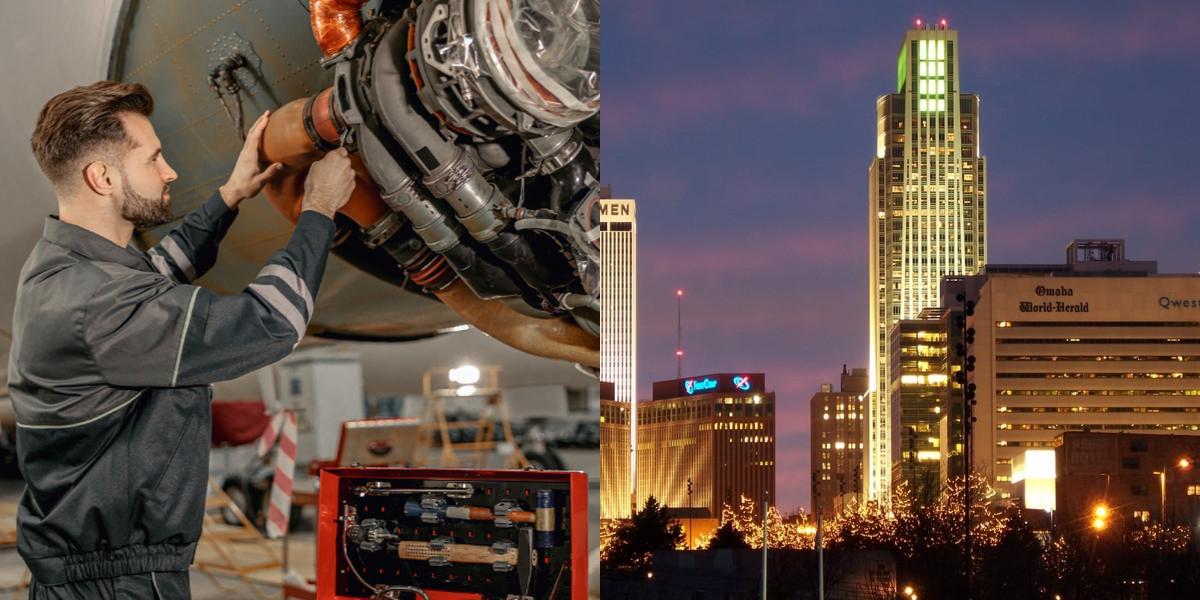How to Become an Aviation Mechanic in Nebraska

Want personalized recommendations?
Let's match you to the right program

Aviation mechanics, also known as aircraft mechanics, play a vital role in ensuring the safety and proper functioning of aircraft. They are responsible for inspecting, repairing, and maintaining aircraft to ensure they meet industry standards and regulations. Here's a guide on how to become an aviation mechanic in Nebraska.
Article continues after recommendations
Recommended for you
What is an Aviation Mechanic?
Aviation mechanics are skilled professionals who specialize in the maintenance and repair of aircraft. Their responsibilities include:
- Conducting inspections and diagnosing mechanical and electrical issues in aircraft systems.
- Repairing or replacing damaged parts and components.
- Performing scheduled maintenance tasks, such as oil changes and engine tune-ups.
- Ensuring compliance with safety regulations and industry standards.
- Keeping detailed records of all maintenance and repair work.
Where do Aviation Mechanics Work?
Aviation mechanics can work in a variety of settings, including:
- Commercial airlines: They may be employed by major airlines to maintain their fleet of aircraft.
- General aviation: They can work for smaller, private companies that operate smaller aircraft.
- Maintenance and repair shops: Some aviation mechanics work in specialized shops that focus on aircraft maintenance and repairs.
- Government agencies: They may find employment with government agencies, such as the Federal Aviation Administration (FAA) or the military.
How to Become an Aviation Mechanic in Nebraska?
To become an Aviation Mechanic in Nebraska, one must first complete an accredited aviation maintenance technician program. After obtaining the necessary certification, individuals can then search for job opportunities in the aviation industry, earning a competitive salary commensurate with their skills and experience.
Requirements to Become an Aviation Mechanic in Nebraska
To become an aviation mechanic in Nebraska, you need to meet certain education and legal requirements. These include:
- Education: You must complete a Federal Aviation Administration (FAA)-approved aviation maintenance technician program. This program provides the necessary knowledge and skills to work as an aviation mechanic. It typically takes 18 to 24 months to complete.
- Legal requirements: Upon completing the aviation maintenance technician program, you must pass the FAA written, oral, and practical exams to obtain your Airframe and Powerplant (A&P) mechanic certificate. This certification is required to legally work as an aviation mechanic in Nebraska.
Exploring a Career in Aviation Mechanic Outside Nebraska
If you've been reading this article and aspire to become an Aviation Mechanic, but you reside in a different state, rest assured that achieving your goal is still within reach. You might consider exploring opportunities to become an Aviation Mechanic in Alabama, Michigan, North Carolina, South Dakota, or Wisconsin. Don't worry if you haven't found your location among these, because Dreambound makes it easier than ever to pursue your dreams regardless of your location by simplifying the process of finding and comparing Aviation Mechanic classes through a convenient search by zip code. With dedication and access to the right resources, you can confidently pursue a successful career in trade, construction, and industry, no matter where you live.
Get courses selected just for you
Try our powerful search engine
Article continues after recommendations
More recommendations for you
How do I get my Aviation Mechanic certification?
If you have a passion for aviation and enjoy working with your hands, becoming an aviation mechanic might be the perfect career path for you. Aviation mechanics, also known as aircraft mechanics or aviation maintenance technicians, are responsible for inspecting, repairing, and maintaining aircraft to ensure they are safe and in proper working order.
To become a certified aviation mechanic, you will need to complete several steps:
-
Education and Training: The first step towards obtaining your aviation mechanic certification is to complete a formal education and training program. There are several options available, including certificate programs, associate degrees, and bachelor's degrees in aviation maintenance or a related field. These programs typically cover topics such as aircraft systems, electrical systems, hydraulic systems, and aviation regulations.
-
Hands-on Experience: In addition to formal education, you will also need to gain hands-on experience working with aircraft. Many aviation mechanic programs include internships or co-op opportunities that allow students to gain practical experience in a real-world setting. This hands-on experience is essential for developing the skills and knowledge necessary to work as an aviation mechanic.
-
FAA Certification: Once you have completed your education and gained the necessary experience, you will need to obtain certification from the Federal Aviation Administration (FAA). The FAA offers several different types of certifications for aviation mechanics, including Airframe Mechanics (A), Powerplant Mechanics (P), and Airframe and Powerplant Mechanics (A&P). To obtain these certifications, you will need to pass a series of written exams and practical tests.
-
Continuing Education: After obtaining your initial certification, it is important to continue your education and stay up to date with the latest advancements in aviation technology. The FAA requires aviation mechanics to complete a minimum of 16 hours of training every 24 months to maintain their certification.
How do I get a job as an Aviation Mechanic?
Once you have obtained your aviation mechanic certification, the next step is to find a job in the field. Here are some tips to help you get started:
-
Build a Strong Resume: Your resume is your first opportunity to make a good impression on potential employers. Make sure to highlight your education, training, and experience in the field. Include any relevant certifications or licenses you have obtained, as well as any special skills or areas of expertise.
-
Network: Networking is an essential part of any job search, and the aviation industry is no exception. Attend industry events, join professional organizations, and connect with other aviation professionals on social media platforms such as LinkedIn. Building a strong network can help you learn about job opportunities and make valuable connections in the industry.
-
Apply for Jobs: Once you have a strong resume and a network of contacts, start applying for jobs. Check online job boards, company websites, and industry-specific websites for job postings. Tailor your resume and cover letter to each job you apply for, highlighting the skills and experience that make you a good fit for the position.
-
Prepare for Interviews: If your application is successful, you will likely be invited for an interview. Take the time to prepare by researching the company, reviewing common interview questions, and practicing your responses. Dress professionally and bring copies of your resume and any supporting documents.
-
Stay Persistent: Finding a job as an aviation mechanic may take time and persistence. Don't get discouraged if you don't hear back from every job you apply for. Keep refining your resume, building your network, and applying for positions that align with your skills and interests.
Career Paths and Opportunities after Becoming an Aviation Mechanic
Becoming an aviation mechanic opens up a wide range of career paths and opportunities. Here are some options to consider:
-
Airlines: Many aviation mechanics choose to work for commercial airlines. In this role, you would be responsible for inspecting and maintaining the aircraft in the airline's fleet. This can be a demanding but rewarding career, with opportunities for advancement and travel.
-
General Aviation: General aviation refers to any type of aviation that is not commercial or military. This includes private aircraft, corporate jets, and flight schools. Working in general aviation allows you to work on a variety of different aircraft and often provides more flexibility in terms of schedule and location.
-
Military: Another option is to work as an aviation mechanic in the military. The military offers a wide range of opportunities for aviation mechanics, from working on fighter jets to helicopters. This can be a great option if you are interested in serving your country while also pursuing a career in aviation.
-
Manufacturing: Aviation mechanics can also work for aircraft manufacturers, helping to build and test new aircraft. This can be an exciting career path for those interested in being on the cutting edge of aviation technology.
-
Maintenance and Repair Facilities: Many aviation mechanics work for independent maintenance and repair facilities. These facilities provide maintenance and repair services to a variety of different customers, including airlines, private aircraft owners, and charter companies.
-
Inspector: If you have several years of experience as an aviation mechanic, you may be eligible to become an inspector. Inspectors are responsible for ensuring that aircraft are in compliance with all applicable regulations and safety standards.
Final Thoughts
Becoming an aviation mechanic can be a rewarding career choice for those with a passion for aviation and a desire to work with their hands. By completing the necessary education and training, obtaining certification from the FAA, and gaining hands-on experience, you can position yourself for a successful career in this field.
Remember to build a strong resume, network with others in the industry, and stay persistent in your job search. Once you have landed a job, there are many different career paths and opportunities to explore, from working for commercial airlines to the military to manufacturing.
Whether you choose to work on commercial aircraft, private jets, or military helicopters, your skills as an aviation mechanic will be in high demand. So take the first step towards your career in aviation maintenance by researching education and training programs and start your journey towards becoming a certified aviation mechanic.
Are you thinking about a job change or wanting to learn more about different career paths? Feel free to check out these additional articles:

Pia Yapjoco is part of the school growth and sales team at Dreambound. She helps facilitate school partnerships that expand educational opportunities for aspiring students in allied health and other trades. Beyond work, she curates her pup's Instagram, hunts for hidden coffee gems, and escapes into cozy gaming.



